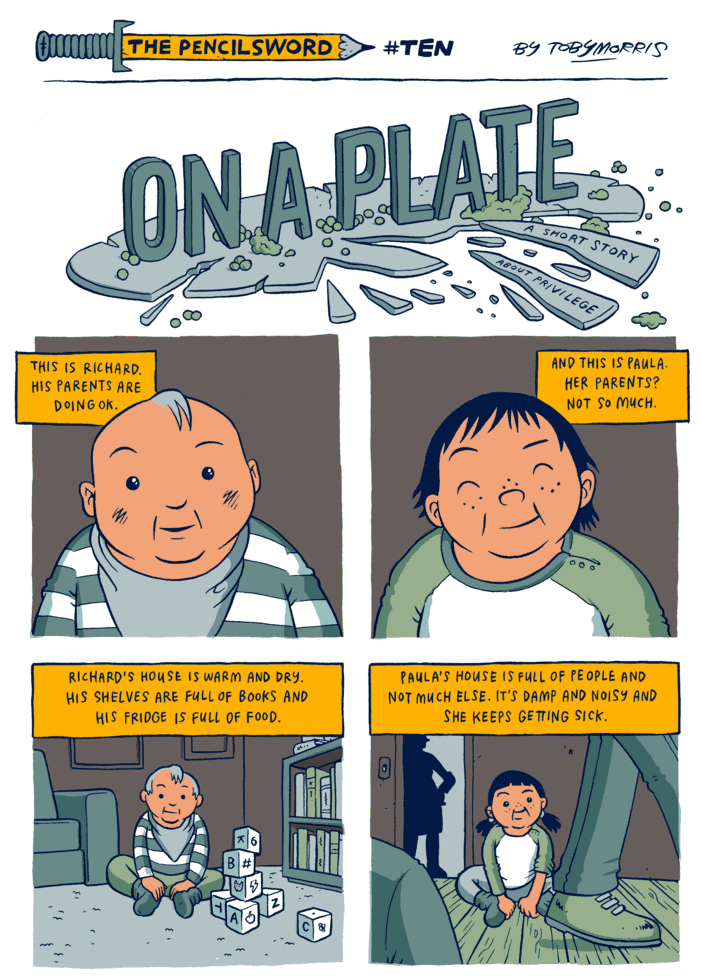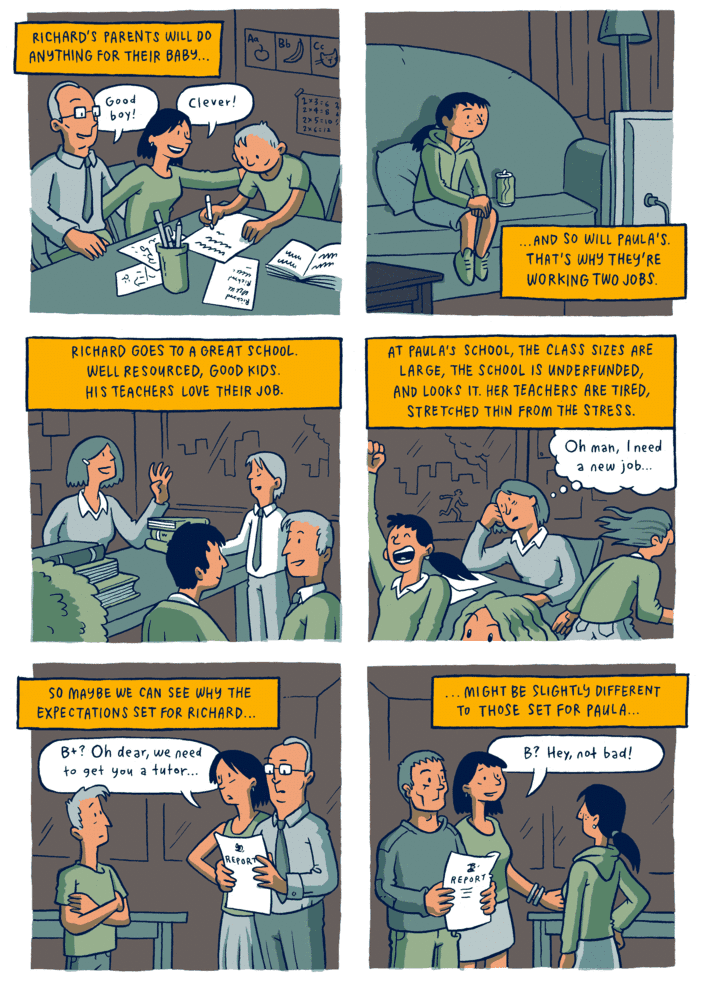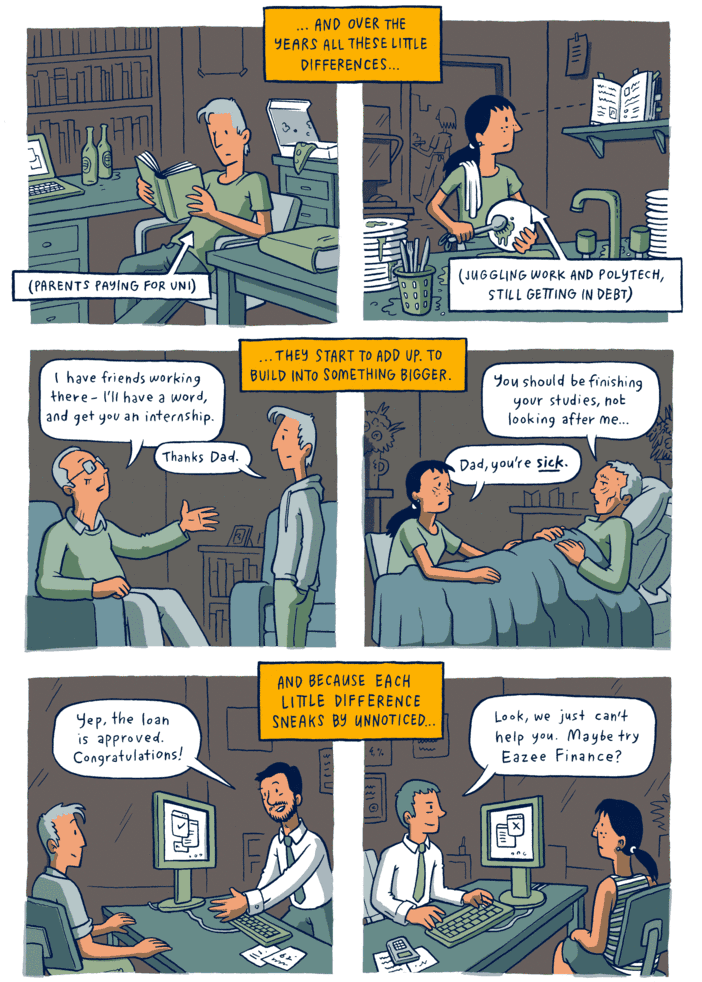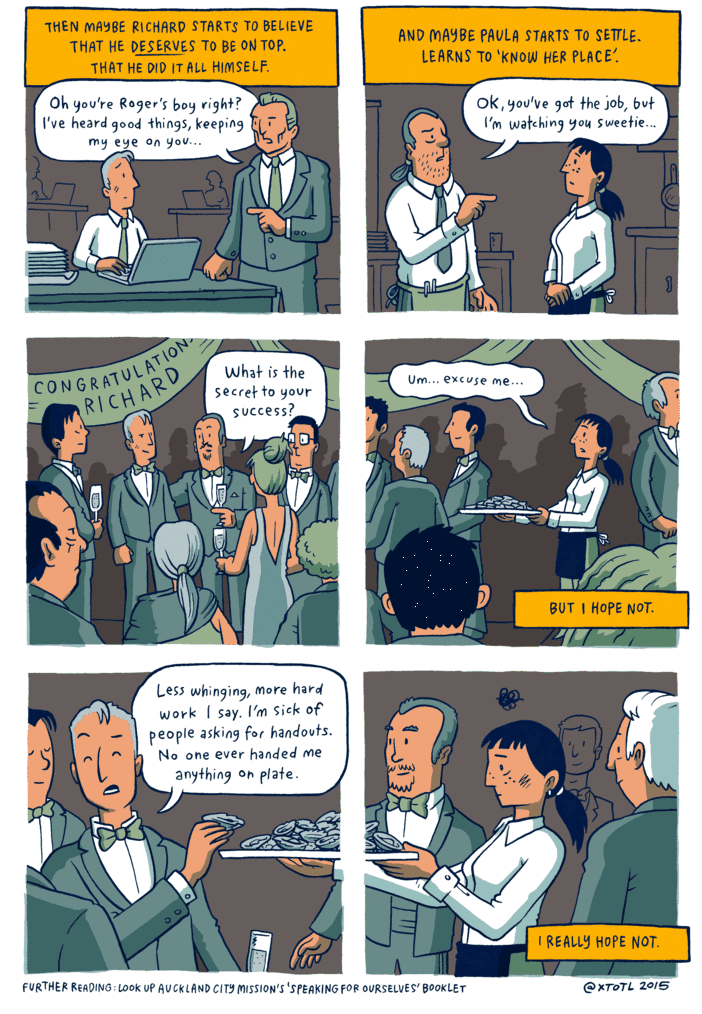I disagree. I think I understand the points and the reality quite well.
Les
From: "Lesicko, Alexandria" <Alexandria.Lesicko@xxxxxxxxxxxxxxxxxxxxxx>
Date: Thu, Jun 8, 2023, 5:06 PM
To: "Bernstein,Leslie" <lbernstein@xxxxxxxx>, AUDITORY@xxxxxxxxxxxxxxx
Subject: Re: [External] Re: arXiv web of trust
*** Attention: This is an external email. Use caution responding, opening attachments or clicking on links. ***I think it's important to establish the DC-level, sea-level, the "reference level." The societal inequities that exist are not because I and other "white guys" (i.e., the "Richards" in the cartoon) were given some undeserved privilege but, rather, because some minorities and cultures (i.e., the Paula's in the cartoon) have been unfairly denied their due. I think it very much matters where one perceives the unfairness to be.
I think you are missing the main point of the cartoons that have been shared here. They are meant to illustrate the point that our gender, racial, etc. identities and economic realities shape our experiences and opportunities in science and in the world. This benefits some people and works against others. The “perceived unfairness” isn’t on one side of the coin or the other, it is all a product of the same system.
I find the self-loathing concept of "privilege" to be misguided folly I will not apologize for what I have accomplished and for what I have. It was not handed to me. For those who still don't understand, I'll say it again. The social injustice lies in the fact that the less fortunate (often minority cultures and ethnicities) have been denied the opportunity and dignity they deserve as human beings. That is where we must focus our efforts for change.
I think this is also a misunderstanding - I don’t think that the concept of privilege invokes self-loathing. Nobody is asking you to apologize and hate yourself for whatever privileges you may have. Further, nobody is saying that you have not worked hard for your accomplishments. My understanding of acknowledging privilege is that it is about humility rather than self-loathing. For example, understanding that my path in life and in my career may have looked different and involved more obstacles if I were a person of color, queer, disabled, etc. You can still be proud of your accomplishments and your hard work while acknowledging this. I also don’t think acknowledging privilege is the end goal in these discussions or an exercise unto itself, but a necessary step in the process of beginning to tackle the social injustices that you mention above. If we cannot first admit that these factors play a role in our trajectories, then it is hard to get any further in enacting change - we are blind to what we are trying to tackle.
It is trivially true to say that, in any field, in any vocation, in any hierarchy, there are biases that come into play. That's because they are all human endeavors. Matters of degree count! In our field of auditory science-- and this is after all the Auditory List-- others here have asserted that discriminatory factors must be at play to a substantial degree. I think that is patently false and my observations across decades support that belief.
You cannot say that because you have not experienced or witnessed discrimination in this field that it does not exist. All you can say is that you have not experienced or witnessed it. Other people on this thread are telling you that their experiences have been different (and citing literature that points to the existence of bias and discrimination at large). Again, it is important to listen to and acknowledge the experiences of other people if we want to address social injustice. People from different demographic backgrounds can have radically different experiences of the same community. You can simultaneously take pride in your field and your community and want to make it better.
Some of you have acted as "scientists" drawing conclusions on the basis of essentially no evidence when you have implied that I, personally, must have a myopic view because you assume that I'm just another fairly successful old white guy. Shame on you. You know nothing of my history and that of my family. You commit the genetic fallacy, that of evaluating an idea on the basis of who generated the idea, rather than on the merits of the idea, per se. In so doing, you commit the very sin that you decry so vociferously in self-righteous fashion!
It seems that most people are replying directly to what you said, point-by-point, not assuming that you must be myopic because you are, as you describe, a “fairly successful old white guy”. 😊
I suggest that you read this excellent work by the brilliant linguist, John McWhorter.
This began as a discussion of open-access dissemination of scientific results. I hope, if this thread continues at all, it will return to that topic, a topic that is most appropriate for the Auditory List.
I don’t think that these topics are inappropriate and are actually very important and beneficial to discuss.
Les
From: AUDITORY - Research in Auditory Perception <AUDITORY@xxxxxxxxxxxxxxx> on behalf of Les Bernstein <lbernstein@xxxxxxxx>
Date: Thursday, June 8, 2023 at 12:10 AM
To: AUDITORY@xxxxxxxxxxxxxxx <AUDITORY@xxxxxxxxxxxxxxx>
Subject: [External] Re: arXiv web of trustI think it's important to establish the DC-level, sea-level, the "reference level." The societal inequities that exist are not because I and other "white guys" (i.e., the "Richards" in the cartoon) were given some undeserved privilege but, rather, because some minorities and cultures (i.e., the Paula's in the cartoon) have been unfairly denied their due. I think it very much matters where one perceives the unfairness to be.
I find the self-loathing concept of "privilege" to be misguided folly I will not apologize for what I have accomplished and for what I have. It was not handed to me. For those who still don't understand, I'll say it again. The social injustice lies in the fact that the less fortunate (often minority cultures and ethnicities) have been denied the opportunity and dignity they deserve as human beings. That is where we must focus our efforts for change.
It is trivially true to say that, in any field, in any vocation, in any hierarchy, there are biases that come into play. That's because they are all human endeavors. Matters of degree count! In our field of auditory science-- and this is after all the Auditory List-- others here have asserted that discriminatory factors must be at play to a substantial degree. I think that is patently false and my observations across decades support that belief.
Some of you have acted as "scientists" drawing conclusions on the basis of essentially no evidence when you have implied that I, personally, must have a myopic view because you assume that I'm just another fairly successful old white guy. Shame on you. You know nothing of my history and that of my family. You commit the genetic fallacy, that of evaluating an idea on the basis of who generated the idea, rather than on the merits of the idea, per se. In so doing, you commit the very sin that you decry so vociferously in self-righteous fashion!
I suggest that you read this excellent work by the brilliant linguist, John McWhorter.
This began as a discussion of open-access dissemination of scientific results. I hope, if this thread continues at all, it will return to that topic, a topic that is most appropriate for the Auditory List.
Les
On 6/4/2023 9:24 PM, Svirsky, Mario wrote:*** Attention: This is an external email. Use caution responding, opening attachments or clicking on links. ***
I have a small contribution to the very interesting conversation between Matt Winn and Les Bernstein.
I recommend those of you who are also interested in this conversation watch “Picture a Scientist”, which is on Netflix in the U.S. until June 12. It is a fascinating description of some of the obstacles faced by women in general and black women in particular, in academia.
I agree with Les that, ideally, status as a researcher should be earned by a person’s contributions to their field. The problem is that in the real world women get fewer resources and less recognition than men given the same intellect and productivity. Ditto for minorities. “Picture a Scientist” doesn’t even get into the issues of class, nationality, or able bodiedness, which are also important.
Or instead of watching Picture a Scientist (which, after all, will take you 103 minutes), you could invest just two minutes in reading the cartoon below. About the concept of having things handed to you on a plate (or “being born on third base and thinking you hit a triple”, a quote attributed to Barry Switzer, 1986).
Mario A. Svirsky, Ph.D.
Noel L. Cohen Professor of Hearing Science,
Professor of Otolaryngology (School of Medicine) and Neural Science
Vice-Chairman for Research
Department of Otolaryngology
Address:
Dept. of Otolaryngology Phone (direct): 212-263-7217
NYU Langone Medical Center Fax: 212-263-7604 or 212-263-8257
550 First Ave., NBV-5E5
New York, NY 10016
Pronouns: he, him, his
CONFIDENTIAL - NYU SCHOOL OF MEDICINE SENSITIVE DOCUMENT
“This email message, including any attachments, is for the sole use of the intended recipient(s) and may contain information that is proprietary, confidential, and exempt from disclosure under applicable law. Any unauthorized review, use, disclosure, or distribution is prohibited. If you have received this email in error please notify the sender by return email and delete the original message. Please note, the recipient should check this email and any attachments for the presence of viruses. The organization accepts no liability for any damage caused by any virus transmitted by this email.”
--
Leslie R. Bernstein, Ph.D. | Professor Emeritus
Depts. of Neuroscience and Surgery (Otolaryngology) | UConn School of Medicine
263 Farmington Avenue, Farmington, CT 06030-3401
Office: 860.679.4622 | Fax: 860.679.2495




